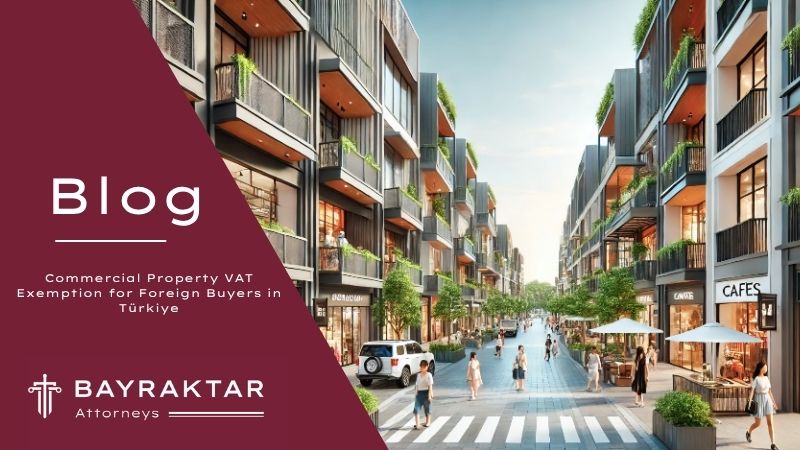
Türkiye has become an attractive destination for foreign investors, not only in residential real estate but also in the commercial property sector. To encourage foreign capital inflow and strengthen the real estate market, legislative changes have introduced a Value Added Tax (VAT) exemption for foreigners purchasing commercial properties.
Considering that the general VAT rate in Türkiye is 20%, benefiting from a full exemption creates a substantial financial advantage for foreign investors. This makes Türkiye one of the most cost-efficient markets for those looking to acquire offices, shops, or other business premises.
This article provides a detailed guide to the commercial property VAT exemption in Türkiye, explaining eligibility requirements, procedural steps, compliance issues, and the potential risks if conditions are not met.
Who Can Benefit from the VAT Exemption?
Under Article 13/i of the VAT Law (3065), the following groups are eligible for the exemption when purchasing commercial property:
Foreign nationalswho are not considered residents in Türkiye.
Foreign corporate entitieswhose legal and business headquarters are located outside Türkiye and who do not generate income through a permanent establishment or representative office in Türkiye.
Turkish citizens living abroadwith a residence or work permit for more than six months, excluding those working for Turkish government agencies abroad.
Importantly, eligible buyers may purchase more than one commercial property under the exemption, provided all conditions are satisfied.
Conditions for Benefiting from the Commercial Property VAT Exemption
The VAT exemption is not automatic; buyers and sellers must meet a series of statutory conditions to benefit from this incentive.
1. First Delivery Requirement
The exemption applies only to the first sale of a commercial property by the developer or constructor. Resales of commercial properties do not qualify.
Additionally, the property must be officially classified as a commercial unit (such as an office, store, or business premise) in the building permit.
2. Payment in Foreign Currency
At least 50% of the purchase price must be transferred to Türkiye before the issuance of the sales invoice, and the remaining balance must be paid within one year. Payments must be brought into Türkiye in foreign currency.
Payments can be made through a Turkish bank transfer.
Alternatively, if brought physically, proof from Turkish Customs (Gümrük İdaresi) is required.
After entering Türkiye in foreign currency, the funds may be converted into Turkish Lira for payment to the seller.
The person making the payment must be the same as the registered buyer of the property.
3. Three-Year Holding Period
The buyer must retain ownership of the property for at least three years from the date of title deed registration.
A restrictive annotation is entered into the land registry stating that if the property is sold within three years, the previously exempted VAT, along with interest calculated under Law No. 6183, will be collected from the seller and the buyer jointly.
Seller’s Obligations and VAT Refund Process
Sellers also carry significant responsibilities under the VAT exemption regime:
They must confirm the buyer’s eligibility by collecting official documentation (typically a VAT Exemption Certificatefrom the tax office).
The transaction must be declared in the VAT returnfor the relevant tax period.
In the declaration, the sale price excluding VATis entered under the “Delivery and Service Amount” column, while the input VATpaid during construction is included in the “VAT Incurred” column.
Sellers may then apply for a VAT refund, but only after the full purchase price has been paid into Türkiye in foreign currency.
Risks of Non-Compliance
If it is later determined that the exemption was improperly applied (for example, if the property was resold before the three-year period expired or if payments were not properly documented), both the seller and the buyer will be held jointly and severally liable for:
The unpaid VAT (20%),
Late payment interest, and
Applicable tax penalties.
This makes it essential for both parties to ensure strict compliance with all exemption conditions.
Why the Commercial VAT Exemption Matters
For many foreign investors, purchasing commercial property in Türkiye offers dual benefits:
Major Financial Advantage:With Türkiye’s VAT rate set at 20%, the full exemption dramatically reduces acquisition costs, creating a significant incentive for foreign buyers.
Long-Term Investment Security:The three-year retention period aligns with Türkiye’s broader real estate and investment regulations, ensuring stability in the property market.
Citizenship by Investment Synergy:Although the VAT exemption itself does not grant citizenship, foreign investors who meet the citizenship investment threshold (currently USD 400,000 in real estate) often use this exemption to maximize the value of their investment.
Practical Tips for Foreign Investors
Engage a Turkish lawyer:Navigating the exemption procedure requires compliance with tax and real estate law. At Bayraktar Attorneys, we ensure full documentation and communication with tax offices.
Plan Payments Strategically:Ensure foreign currency transfers are well-documented to avoid disputes with the tax office.
Verify the Property’s Classification:Confirm that the property is officially recorded as commercial (işyeri) in the building license and land registry records.
Respect the Three-Year Rule:Early resale will eliminate the VAT advantage and create financial liabilities.
Conclusion
The Commercial Property VAT Exemption in Türkiye is one of the most attractive incentives for foreign investors, especially given the 20% standard VAT rate. This exemption translates into substantial savings, making Türkiye an increasingly competitive market for foreign investment in commercial real estate.
By carefully planning the transaction and working with experienced legal counsel, foreign buyers can not only benefit from this powerful tax incentive but also safeguard their investment against future risks.
At Bayraktar Attorneys, we guide foreign investors through every stage of the VAT exemption process, from document collection to land registry annotation and tax office coordination, ensuring a smooth and legally secure transaction.
Recently Added Blogs



.png)
.png)
.png)
.png)
